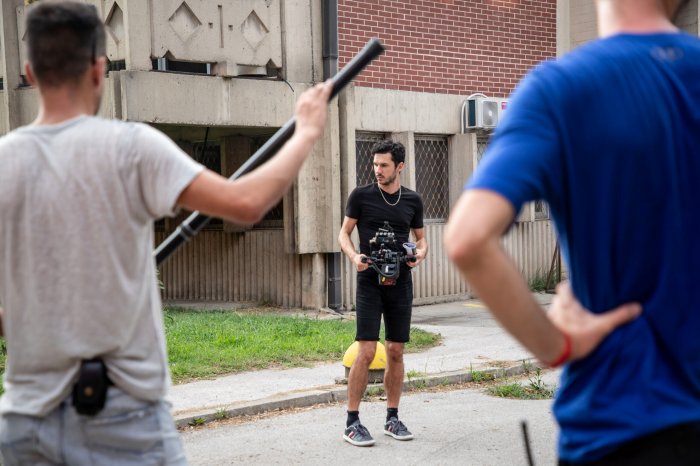IN THE NOH: Gillette's Edge|Broadway memories; gay-straight bleed in film; French kisses.
By: DAVID NOH | Anita Gillette has always exuded an instant onstage warmth and empathy, reminiscent of such great character actresses as Eve Arden or Fay Bainter. You can see her with Jamie Farr in “Flamingo Court” (New World Stages; 212-239-6200).
“Come see a matinee,” she told me before a recent performance, “just for our audiences because this is a show that definitely needs that rhythm and audience participation. The laughs are rolling and we've learned to play these long rolling laughs — it's shameless what we're doing!
“The show is three sketches in two acts. They're all about love, in a way, and I play an Italian woman seeking a second chance at romance, a much older lady facing aging, illness, and death with her partner and, finally, an all-out burlesque in which I'm a wild hooker named ChiChi Le Boomboom. I get to go a pretty full range as you can see. It's a workout.”
Gillette hasn't been on a New York stage since “The Oldest Profession” (2004): “You have to have time in your third act to enjoy your life. I have one sibling who got married five times and I missed every single wedding because I had to be at the theater. My husband died nine years ago and that time when he was dying I focused on him, and sometimes I think of all the nights I spent not being around him.
“He loved the theater and never complained, but when it becomes your master, you have to watch out and get a balance. I don't mean this to be such a downer, but I had another loss in 2004 when my granddaughter was killed in an accident. I've turned down a lot of work, but really wanted to get back in New York again.”
Gillette made her Broadway debut in “Gypsy,” with Ethel Merman: “I took over the role of June, and then I got pregnant and they were going to fire me, but Merman said, 'No, the kid stays in the show!' just like in the movies. She protected me, we hit it off, and that's when I met Jack Klugman with whom I later did 'Quincy.' I was a sponge soaking it all up — she had such focus onstage. There was no Actors Studio preparation, doing strange things to get in the mood. She just was. For me, there'll never be anybody else in that role, although I loved what Patti LuPone did with it.”
Irving Berlin admired Gillette in “All American,” and, when casting “Mr. President” (1962), said, “Get me an Anita Gillette type.” Her agent jumped, and she got the role after two auditions: “Burt Lancaster used to flash his teeth at me and tell me, when I'd say, 'I can't wait to get there,' 'Anita, there is no there. Hank Fonda got every fucking role I ever wanted!' It's all relative, isn't it?
“It was rumored that Berlin had had a nervous breakdown, not having written anything since 'Call Me Madam,' and everyone was very protective of him. When we opened in Boston, the review's headline was 'Knee-Deep Amidst the Corn.' I was walking across the Common with him, Leland Hayward, and Josh Logan and no one brought it up, except, finally, Berlin. He said, 'This critic is right. I agree with him. I know I write corny songs: “White Christmas” — that's a corny song. “Blue Skies,” “God Bless America.” These are very corny songs, but then so's “My Old Kentucky Home,”' so we all realized that, from a composer's point of view, he is the voice of patriotism — no other composer could take that away from him, except maybe Stephen Foster — and he was very proud of that.”
“Just don't ask me about [my co-star] Nanette Fabray. She was a problem for me. I never could get close to her, I tried. She had a little kid at that point which was shocking, to have her first child at such an age.
“I only found out years later when I did 'Moonstruck,' and Theoni Aldredge was dressing me. She said, 'I'm so glad to see you, because I have to tell you — do you remember all those dresses we had to change for that “Laugh It Up” number? All those beautiful dresses and the next night you would have to wear something else? That was because of Nanette — she didn't want you to wear anything she thought was better than hers.'
“And another thing I didn't like was in Berlin's biography, 'As Thousands Cheer,' the author only interviewed her, and she put Robert Ryan down. I resented that because I thought he was damn good — he'd never sung before and gave a kind of Lincoln-Kennedy-esque grounding to that character which the show needed. I was there every performance and don't remember him goofing his lines or not knowing where he was, all the things she accused him of. He was a wonderful, solid guy who wouldn't bend to whatever she wanted him to do.”
Gillette worked for legendarily monstrous producer David Merrick in “Carnival”: “Oh, he was a character! When Anna Maria Alberghetti left and I replaced her, they took a photo of me pointing to my name over the title at the Imperial Theatre. When the show was over, I got a bill from a Paramus sign company for $90. Apparently, my agent hadn't worded it correctly in the contract. I took it to Equity, but they took Merrick's side and I had to pay up, when salaries in those days weren't very big.
“But I really miss him, and producers like that, very show biz with always something going on, very dramatic, as opposed to today's corporate quality, with everyone being on track. Nowadays, if you say something about anything and a dresser hears it, he reports it to the assistant stage manager, who writes this nightly detailed report about what went on in the theater, including 'Anita complained about the length of her hem.' It's like being spied on! So I miss the old days but I'm sure having a good time doing what I'm doing.”
Gillette played Tina Fey's mother on the hilarious “30 Rock”: 'Do you think they'll have me back? Buck [Henry, who played her husband] said, 'Don't worry — we'll be back.' I fell in love with Tina, so incredible, who called me up for this, and I told her, 'Please, I'll baby-sit your child — I live around the corner from you.' There are a lot of actresses out there who would love that job, so that was a good coup. And 'CSI' is every bit as good in its opposite way, so I was very lucky I got onto those two shows.”
“Hamlet 2″is the funniest American film since “Juno,” in which Steve Coogan plays a loser of a high school drama teacher, bent on saving his department with a Shakespearean sequel starring a misfit class of Hispanics, along with a bigoted white chick and a conniving gay drama nerd. Joyously un-PC, it's the brainchild of writer/director Andrew Fleming, who told me, “For something to be really funny you have to find something that makes people anxious. You have to explore what's uncomfortable, and once you start offending people you have to be equal opportunity. I'm gay and I certainly didn't make the gay kid any kind of hero. At first, I thought, 'Is this cool?' But then I thought, 'Well, we make everyone else look like an ass, why not the gay character?'”
As for being out in Hollywood, Fleming said, “I like the fact that it's a non-issue. I did 'Threesome,' back in 1994 and it was picked up by a studio. The main character was gay and it was very autobiographical, very personal to me then, because the gay guy was burying it. I grew up in LA and New York and nobody around me ever had a hang-up about anybody being gay. Very early on, a New York Times writer asked, 'Are you gay?' and I said yes. That was sort of it, and I didn't realize then that that was a very rare thing. I don't even know if there was another director who was out at that point, but it was really only 15 years ago, which shows how much things have changed. Although there's a gay character in 'Hamlet 2,' it's not a gay film from a gay ghetto. Straight and gay worlds should bleed into each other — there shouldn't be this strict line between them.
“I have a partner for almost 18 years. He's an executive in the business, but we've never worked together, happily. It's been very good. We were at Outfest, and we ended up winning two audience awards. I accepted one on behalf of him, because he's put up with so much, you know. Never marry a director! We're either obsessed or depressed. His name is Scott Nicolaides, no, not Rudin, although Scott Rudin was the executive producer on the first movie I did, 'Bad Dreams'(1988), when he was running Fox. He's doing all right…”
Films worth catching in Film Forum's delectable French Crime Wave series: “La Verite,” with Brigitte Bardot's greatest performance as a no-good nymphet who only believes in Marlon Brando; “Diabolique” and “Casque D'Or,” which show off the dazzlingly virtuosic range of the great Simone Signoret; “Classe tous Risques,” a wholly satisfying gangster flick with a range of sexy thugs, from Lino Ventura to Jean Paul Belmondo; “Pepe le Moko,” the ultimate Casbah melodrama with the molten chemistry of Jean Gabin and exquisite Mireille Balin; “Elevator to the Gallows,” featuring Jeanne Moreau's superb sullenness and Miles Davis' score; Truffaut's gorgeously melancholic and funny “Shoot the Piano Player,” and, of course, Jean Luc Godard's ground-breaking “Breathless” and “Band of Outsiders,” perhaps even more rewarding, witty, and fresh today, in this largely CG-ridden, mindlessly violent cinematic age (212-727-8110 or filmforum.org).
Contact David Noh at Inthenoh@aol.com
.

































